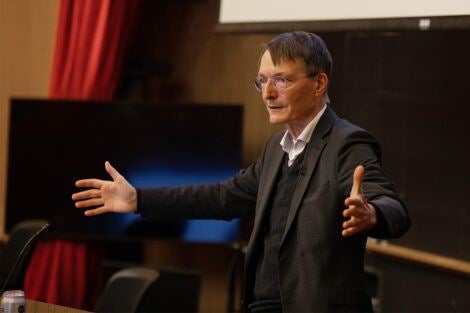Epidemiology—and turning research findings into policy—are both key to improving public health, says German health minister Karl Lauterbach at Cutter Lecture
December 15, 2022 – One day in the mid-1980s, when then-medical student Karl Lauterbach was learning the ropes in the operating room at the University of Texas–San Antonio, he came to the realization that for every ten patients, eight or nine of them had diseases or injuries that could have been prevented.
“That’s actually how I made up my mind to leave surgery and move forward into epidemiology,” Lauterbach told a packed audience in Harvard T.H. Chan School of Public Health’s Snyder Auditorium on December 9. “We know so much, but so little of it gets worked into practice.”
Lauterbach, an adjunct professor of health policy and management at Harvard Chan School who is currently serving as the federal health minister of Germany, was on hand to deliver the 174th Cutter Lecture, the oldest lecture in epidemiology and prevention, established by the bequest of John Clarence Cutter in 1912. In his address, Lauterbach examined how to improve the implementation of epidemiological research so as to provide greater benefit to patients and the public.
“From the very beginning of my career, I have always felt the tension between the beauty of science and the necessity to bring science into practice,” said Lauterbach, who earned three degrees at Harvard Chan School in the 1990s before going on to advise politicians in Germany, eventually becoming a member of the German Bundestag himself.
As health minister, Lauterbach has been involved in multiple efforts to translate health research into policy, such as shortening hospital stays so they don’t last longer than what is medically necessary, and enacting minimum volume laws for surgeries, in keeping with research showing that death rates decline when surgeons have more familiarity with procedures. Germany has also enacted disease management programs based on the latest evidence about best practices, and has tied hospital reimbursements in part to how closely these practices are followed.
For his talk, Lauterbach focused on three areas—aging, climate change, and environmental health—that could see improved outcomes if evidence-based practices were more widely implemented. In both Europe and the U.S., he said, doctors and public health officials are dramatically underprepared for the health challenges that will emerge when boomers age out of the workforce and develop multiple chronic conditions. “[The boomers] will basically switch sides from currently being the most important providers of medical care to being the recipients of medical care,” Lauterbach said. As the population ages there will be increasing cases of cancer and dementia, he noted. One good option for cancer patients could be the creation of more specialized centers for treatment, as evidence has shown that such centers are associated with longer lifespans and better quality of life, he said.
Discussing climate change, Lauterbach noted that people don’t necessarily focus on its potential health impacts but there are plenty of them, including drought, hunger, storm damage, increased conflict, and more pandemics. By drawing attention to these effects, health advocates may be able to sway public officials to focus on concrete steps they can take to lower emissions, including policies supporting zero-emission buildings and sustainable agriculture practices.
Lauterbach also spoke about the importance of applying evidence to policies around other environmental health issues, such as air pollution, particularly in developing countries. As an example, he noted that one of the major drivers of fine particle–related cardiovascular diseases in Africa is cooking with wood. “If cooking was done with electrical sources, then many of those patients would simply never develop the disease,” he said. Often, he added, this kind of intervention don’t take huge amounts of cash to implement. “These are not expensive investments,” he said. “It is simply putting knowledge into practice.”
Bridging the gap between existing research and the policymakers who have the power to implement it could help save countless lives, according to Lauterbach. “I truly believe epidemiology is the key science for the problems we are facing,” he said. “Policy expertise and epidemiology are the twin sciences in order to make a better world.”
Photo: Osa Igiede
